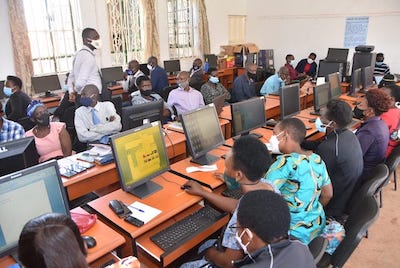The UNESCO Regional Office in Nairobi in close collaboration with the Ministry of Education and Sports in Uganda, GESCI and other partners organized a 5-day training for 40 teachers from 20 special and inclusive primary schools drawn from West, North, Central and Eastern Uganda. The training, which took place from 18 – 22nd October , 2021 at St. Noa Mawagali Core Primary Teacher Training College in Mityana District, focused on the use of Assistive Technologies and adaptation of interactive digital textbooks to improve learning outcomes.
Welcoming participants on the first day of the training, Mrs. Beatrice Kayegi, Principal St. Noa Mawagali Teacher Training College said she was pleased that the training is taking place at an institution that prepares teachers for the classroom. She went on to say that the training is very timely because of the COVID19 era and in the 21st century, we are all trying to embrace technology in teaching and learning especially having the special needs education aspect included.
“We thank UNESCO and partners for this training to equip teachers with knowledge on using assistive technologies and devices in teaching learners with disabilities to improve learning outcomes.” Mrs Kayegi concluded.
User Experience
Bazil Onen,a Programme Director at Oysters and Pearls Uganda and an ICT teacher for learners with visual impairment at Gulu High School shared his experience without assistive technologies and with technology since he was born blind.
“Nothing hurts more than depending on someone to read out textbooks for you. We had materials, but I could not use them. My break came when I started to interact with a computer, since no one could teach me how to use it, I had to learn. A friend introduced me to a software that made the computer speak!” Mr. Onen remarked.
“Technology makes things easy for people with no impairment but for Persons with Disabilities, technology makes things possible, and this is big.” He said.
Bazil’s experience laid ground for participants to feel the need and timeliness of this training targeting teachers at Early Childhood Education where the foundation of learning starts.Bazil was one of the facilitators at the 5-day training.
Policy and Development
Ms. Sarah Bugoosi, Commissioner Special Needs Education Ministry of Education and Sports Uganda reminded participants that this teacher training aims at supporting those who cannot read print and other physical textbooks. On accessible digital learning materials, she said, “We are happy that with the domestication of the Marrakesh Treaty we will be able to customise the digital textbooks for use in Ugandan Schools.”
Mr. Jerome Morrissey,CEO GESCI, echoed the commissioner’s sentiments the teachers taking part in the training are the professionals who can make inclusive special needs education a reality. Digital technologies and interactive learning content will become increasingly affordable and available and the trained teachers will have the expertise to incorporate them in their teaching.
In his key note remarks, Dr. Saidou Sireh Jallow, Senior Program Specialist – Chief of Education, UNESCO Regional Office for Eastern Africa, Nairobi appreciated the United Nations Partnerships on the Rights of Persons With Disabilities (UNPRPD) for supporting this training under the Accessible Digital Textbooks Project which is an innovative initiative being implemented by UNESCO through the development review and inclusive policies on Accessible Digital Textbooks for learners with Disabilities in Uganda, Kenya and Rwanda.
Dr. Jallow went on to say that UNICEF and the Ministry of Education and Sports Uganda have already developed pilot ADTs (Accessible Digital Textbooks) for grade 4 and 6 and the materials were adapted in audio format for learners with low vision/blind, large text and enhanced graphics for learners with low vision and sign language for learners with hearing impairments. He concluded saying UNESCO is and will continue building on these efforts by supporting training to enhance the capacity of teachers on the use of interactive Accessible Digital Textbooks and adapting content to improve learning outcomes to ensure inclusive education and access to information for PwDs.
During the training, the participants were taken through available Assistive Technologies (both software and Hardware) for learners with Visual Impairments (VI), Hearing Impairments (HI), Physical Impairments (PI), Learning Impairments (LI) and Intellectual Disabilities (ID).
Content adaptation was also a key area of the training so that teachers acquire skills on customizing Open Educational Resources and available textbooks into interactive digital textbooks that address the country’s needs. The training content was designed to ensure that teachers can handle learning diversities among learners to enhance inclusive learning using assistive technologies and Accessible Digital Textbooks.
The overall objective of the training was to ensure teaching and learning for learners with disabilities is made more inclusive and accommodating, in line with the United Nations Convention on the Rights of Persons with Disabilities (2006) and Sustainable Development Goal 4 which aims to ensure inclusive and equitable quality education and promote lifelong learning opportunities for all through a range the use of available Assistive Technologies. A similar training was conducted for 70 teachers from Kenya and Rwanda.
The ADT Project is funded by the United Nations Partnership on the Rights of Persons with Disabilities (UNPRPD).



